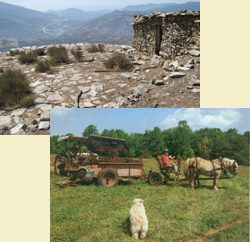Social Futures, Peak Oil, Relocalization
Visioning County Food Production – Part Five
Sunday, October 24th, 2010Part Five: Peri-urban Agriculture
This series of articles is an exploration of designs for agriculture in Tompkins County to approach sustainability in a future of declining access to the cheap energy and other inputs on which our industrialized food system relies. In earlier parts of this series, I proposed principles of agroecosystem design; addressed the [...]
Visioning County Food Production – Part Six
Tuesday, August 10th, 2010Part Six: Rural Agriculture
This series of articles is an exploration of designs for agriculture in Tompkins County to approach sustainability in a future of declining access to the cheap energy and other inputs on which our industrialized food system relies. In earlier parts of this series, I proposed principles of agroecosystem design; addressed the key [...]
The Population “Bomb” and its Distortions in Capitalist Culture
Tuesday, July 20th, 2010Ever since Malthus, the question of population overshooting carrying capacity has been cast as the specter of unwashed ever-breeding hordes who will overrun the society of “developed” nations and bring an end to “progress”. That this way of thinking became an historical pattern arises from a capitalist culture that justifies its economic system and excuses [...]
The basic flaw in “Green Energy”: Power down is the only sustainable option
Saturday, July 10th, 2010There is a basic flaw in the idea that a massive transition to alternative fuels is a sustainable solution: Any significant replacement of fossil fuel with “renewable energy” will continue to eat up the other key materials that are critical to the survival of industrial societies. Without these finite resources, the present production of “stuff” [...]
Invisible Ships and Boiling Frogs: The End of Industrial Affluence
Monday, June 7th, 2010It is said that when the ships of the Old World first approached the New World, they were sometimes invisible to the indigenous people of the Americas because the latter could not imagine such a thing as a fleet of large sailing ships, and simply did not believe their eyes.
In the same way, when a [...]
Visioning County Food Production – Part Four
Monday, April 19th, 2010Urban Agriculture
This series of articles is an exploration of designs for agriculture in Tompkins County to approach sustainability in a future of declining access to the cheap energy and other inputs on which our industrialized food system relies. In earlier parts of this series, I proposed principles of agroecosystem design, addressed the key [...]
Visioning County Food Production – Part Three
Monday, March 8th, 2010
Seeing County Food Production as an Integrated Whole
In Part One of this series, I proposed principles of agroecosystem design for growers to follow if agriculture is to approach sustainability in a future of declining access to the cheap energy and other inputs on which our industrialized food system relies. I said that providing [...]
Through the Looking Glass: Adventures in Landgrant Land
Saturday, February 27th, 2010 Through the Looking Glass: Adventures
in Landgrant Land
- Karl North, 5-09
“If Alice were reborn in these times, she would not need to step through the mirror; it would suffice that she lean out the window.” – Eduardo Galeano
Once upon a time in a faraway empire, a land so prosperous it overflowed with gmo milk, [...]
Visioning County Food Production – Part Two
Monday, February 15th, 2010General Problem Areas in Sustainable Agricultural Design
In Part One of this series, I noted that providing for the local food needs of urban populations requires a design that integrates three overlapping categories of production systems: urban agriculture systems (many small islands of gardening in the city center), peri-urban agriculture (larger production areas on the immediate [...]
Visioning County Food Production – Part One
Sunday, February 14th, 2010Visioning County Food Production
by Karl North
“Because energies and monies for research, development, and thinking are abundant only during growth and not during energy leveling or decline, there is a great danger that means for developing the steady state will not be ready when they are needed, which may be no more than 5 years away [...]
